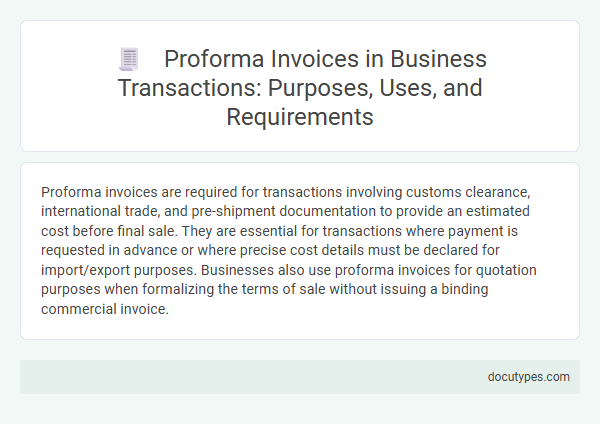Proforma invoices are required for transactions involving customs clearance, international trade, and pre-shipment documentation to provide an estimated cost before final sale. They are essential for transactions where payment is requested in advance or where precise cost details must be declared for import/export purposes. Businesses also use proforma invoices for quotation purposes when formalizing the terms of sale without issuing a binding commercial invoice.
Introduction to Proforma Invoices in Business
Understanding when to use a proforma invoice is essential for smooth business transactions. These preliminary documents outline the details of a sale before the final invoice is issued.
- International Trade - Sellers provide proforma invoices to buyers for customs clearance and shipment preparation.
- Advance Payments - Proforma invoices request deposits or full payment before goods or services are delivered.
- Quotation Requests - Businesses use proforma invoices to present estimated costs to customers before confirming an order.
Definition and Key Features of Proforma Invoices
A proforma invoice is a preliminary bill of sale sent to buyers before goods or services are delivered. It outlines the estimated costs, quantities, and descriptions of products involved in the transaction.
Transactions such as international trade, custom clearance, and pre-shipment agreements often require a proforma invoice. Your suppliers use this document to provide a clear understanding of payment terms and shipment details before finalizing orders.
Main Purposes of Proforma Invoices
A proforma invoice serves as a preliminary bill of sale sent to buyers before the final transaction occurs. It outlines the terms of sale, pricing, and items involved in the transaction to avoid misunderstandings.
- Customs Declaration - Used to provide customs authorities with an estimated value for goods during international shipments.
- Quotation for Buyers - Offers a clear price estimate to help buyers understand costs before committing to purchase.
- Budget Approval - Assists businesses in obtaining internal approval or financing before finalizing the transaction.
Common Uses in Domestic and International Trade
Proforma invoices are commonly required for international trade transactions involving the shipment of goods where customs need an estimated cost before final sale. In domestic trade, businesses use proforma invoices to provide buyers with detailed price estimates before finalizing purchase orders. These documents also serve as formal quotes for services or goods, helping both buyers and sellers agree on terms prior to payment or delivery.
Essential Elements of a Proforma Invoice
A proforma invoice is essential for international trade, advance payments, and customs declaration transactions. It includes key elements such as seller and buyer information, a detailed description of goods or services, pricing, and payment terms. Your proforma invoice must also specify delivery details, validity period, and any applicable taxes or duties to ensure clarity and legal compliance.
Proforma Invoice vs. Commercial Invoice
What types of transactions require a proforma invoice? Proforma invoices are typically used for international trade, customs declarations, and pre-shipment documentation to provide an estimated cost before the final sale. Unlike a commercial invoice, which serves as a legal bill, a proforma invoice is not a demand for payment but a promise of goods or services.
How does a proforma invoice differ from a commercial invoice? A proforma invoice outlines the details of a transaction before it is finalized, helping you understand costs and terms upfront. A commercial invoice, however, is issued after goods or services are delivered and is used for payment processing and customs clearance.
Regulatory and Compliance Requirements
| Transaction Type | Regulatory and Compliance Requirements | Purpose of Proforma Invoice |
|---|---|---|
| International Trade | Customs authorities require detailed value and description of goods for import/export declarations. | Facilitates customs clearance by providing advance information about shipped items. |
| Pre-Export Shipments | Compliance with export control laws mandates documentation of products and export value before shipment. | Serves as a binding quote for goods prior to final sales invoice issuance. |
| Government Contract Bidding | Regulatory bodies require precise cost estimations and specifications for approval and budgeting. | Acts as a formal offer outlining terms and pricing ahead of contract award. |
| Customs Bond Applications | Bond issuers need proforma invoices to assess shipment value and potential duties. | Supports obtaining customs bonds by providing necessary transaction details. |
| Product Licensing and Approval | Regulatory agencies request detailed product descriptions and pricing information before certification. | Assists in regulatory review processes by detailing product and cost for approval. |
| Advance Payment Requests | Financial compliance requires clear invoicing documentation for prepayment authorization. | Provides You with a formal statement of costs prior to payment. |
Benefits for Buyers and Sellers
Proforma invoices are essential for various types of international and domestic transactions where a detailed preliminary bill is required. They provide clarity and security by outlining the terms and costs before the final sale is confirmed.
- Customs Clearance - Proforma invoices help buyers and sellers accurately declare goods to customs authorities, reducing delays and compliance issues.
- Quotation and Price Confirmation - They act as a formal price quote, allowing buyers to understand their financial commitment before purchase approval.
- Advance Payments - Proforma invoices enable sellers to request deposits or advance payments, securing commitment from buyers.
Both buyers and sellers benefit from improved transparency and trust, minimizing disputes and ensuring smoother transaction processing.
Best Practices for Creating Proforma Invoices
Proforma invoices are essential for international trade, customs declarations, and pre-shipment payment requests. They clearly outline the estimated costs and details before a formal sale agreement is finalized.
Best practices for creating proforma invoices include providing accurate descriptions of goods or services, specifying quantities and unit prices, and stating the total estimated cost. Include clear payment terms, shipment details, and validity dates to avoid misunderstandings. Ensuring the invoice is easy to read and professionally formatted enhances credibility and facilitates smooth transactions.
What Types of Transactions Require a Proforma Invoice? Infographic

